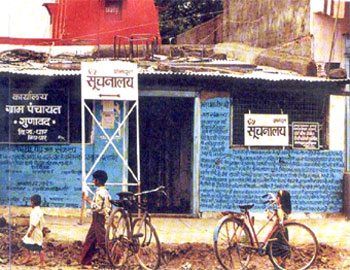|
Introduction
 |
Gyandoot is an intranet in Dhar district connecting rural cybercafes catering to the everyday needs of the masses. The Dhar district in central India has a population of 1.7 million; 60% live below the poverty line. The goal of the Gyandoot project has been to establish community-owned, technologically innovative and sustainable information kiosks in poverty stricken, tribal dominated rural areas of MP. |
Application Context
During the design phase of the project, meetings were held with villagers to gather their input. Among the concerns highlighted by villagers was the absence of information about prevailing agriculture produce auction centre rates. Copies of land records also were difficult to obtain. A villager had to go out in search of the patwari , who often was difficult to get hold of. To file complaints or submit applications, people had to go to district headquarters (which could be 100 miles away), resulting in a loss of wages/earnings.
New Approach
The Gyandoot project was launched on January 1, 2000 with the installation of a low cost rural Intranet covering 20 village information kiosks in five Blocks of the district. Later, 11 more kiosks were set up. Villages that function as Block headquarters or hold the weekly markets in tribal areas or are located on major roads (e.g., bus stops) were chosen for establishing the kiosks. Each kiosk caters to about 25 to 30 villages. The entire network of 31 kiosks covers 311 Panchayats, over 600 villages and a population of around half a million (nearly 50% of the entire district).
Kiosks have been established in the village Panchayat buildings. Information kiosks have dial-up connectivity through local exchanges on optical fibre or UHF links. The server hub is a Remote Access Server housed in the computer room in the District Panchayat.
User fees are charged at the kiosks for the services provided. Local rural youth act as entrepreneurs, running these information kiosks along commercial lines. A local person with a 10-year schooling (matriculate) can be selected as a operator. He/she needs only maintenance, limited typing (software is menu driven) and numeric data entry skills.
Services Offered
Services offered at the kiosks:
- Agriculture Produce Auction Centres' Rates
- Copies of Land Records
- On-line Registration of Applications
- On-line Public Grievance Redress
- Village auction site
- Information regarding government programs
- A forum for school children to ask questions
- On-line matrimonial advertisements
- Email, STD-PCO, photocopier (provided only at some kiosks)
Benefits and Costs
- The network was set up at a total cost of Rs. 2.5 million.
- The average cost of establishing a single kiosk was Rs. 75,000.
- The operational costs are Rs. 1,000 per month.
- Each kiosk earns a gross income of Rs. 4,000 per month.
A few examples of benefits of the kiosks to the rural population:
- Access to market rates leads to better deals.
- Greater computer literacy.
- Speedy implementation on complaints by authorities.
- Greater awareness in case of epidemic.
Other Information
Awards & Achievements
- Stockholm Challenge IT Award 2000 in the Public Service and Democracy category.
- CSI-TCS National Award for Best IT Usage for the year 2000.
Contact Information
|